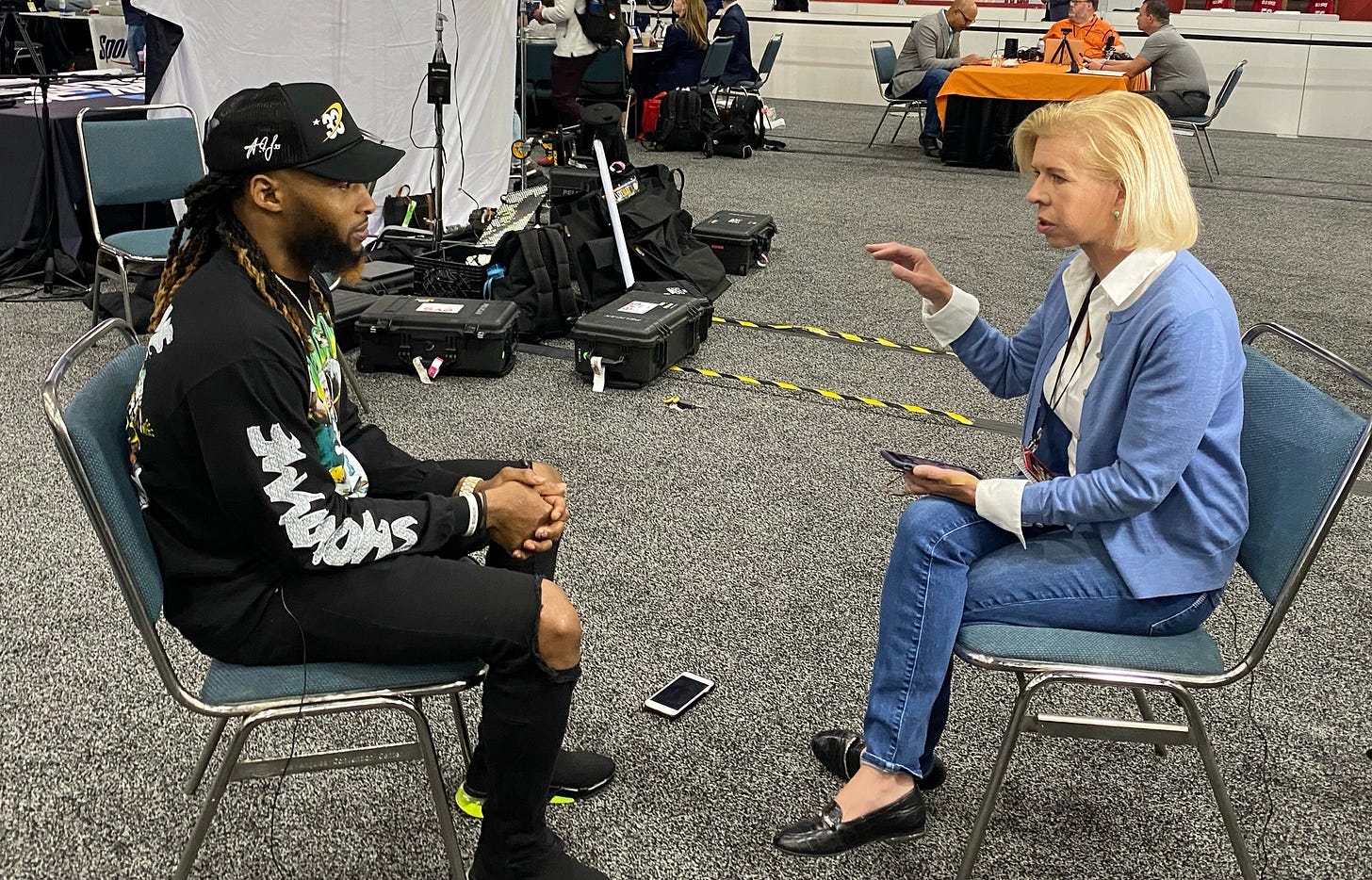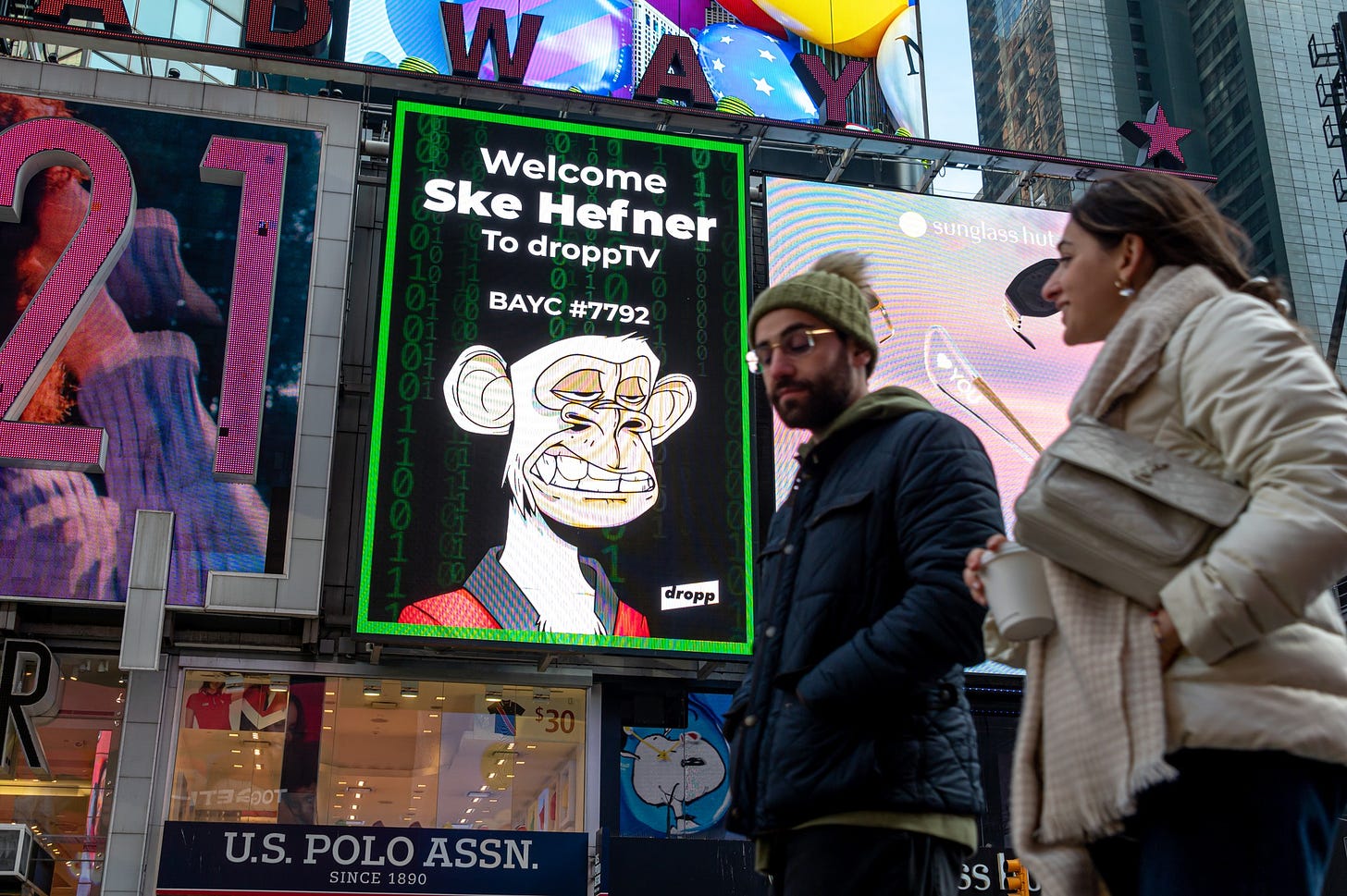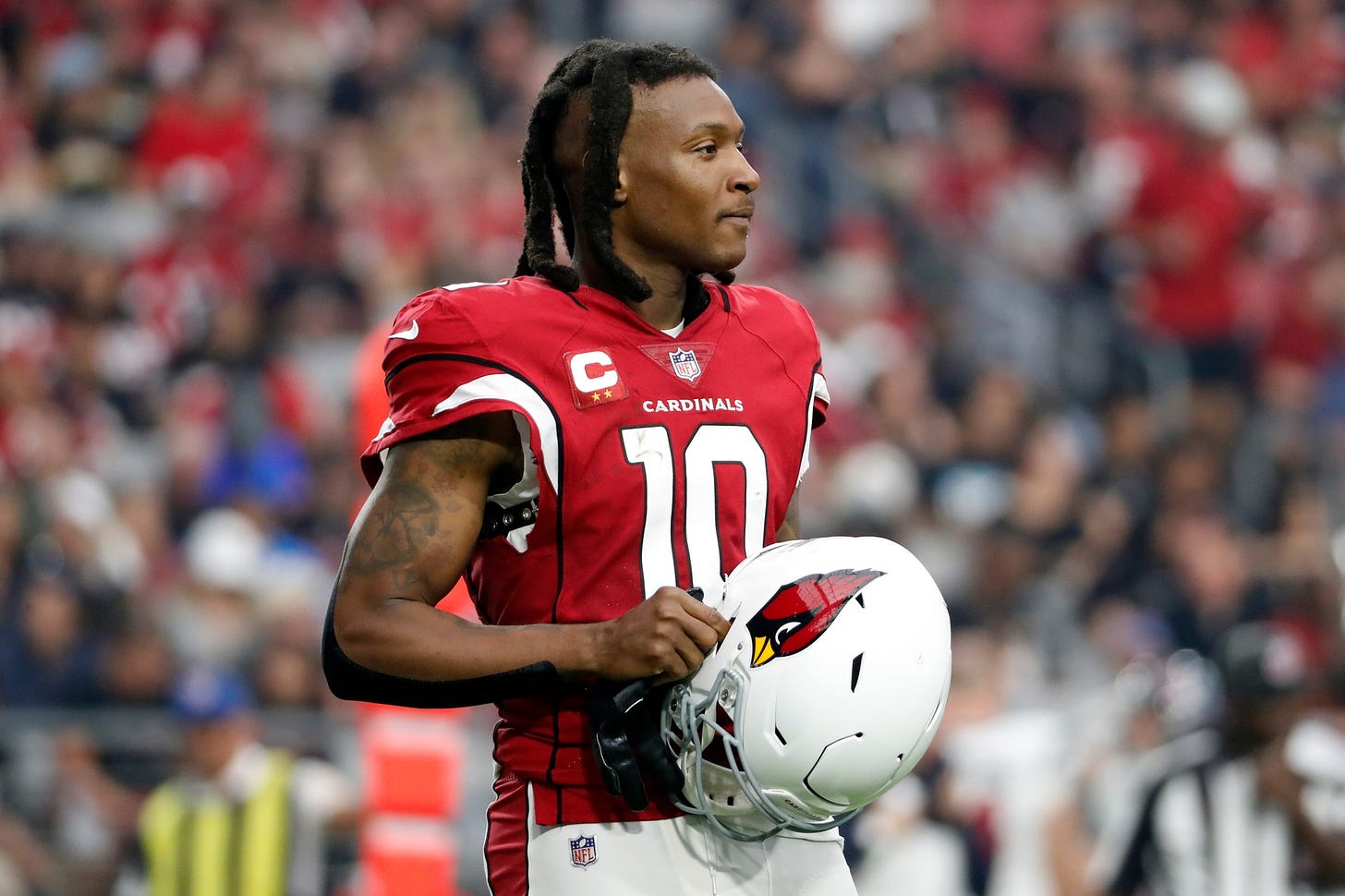NFL PLAYERS HANDLE THEIR OWN FINANCES
Aaron Jones gets paid in crypto, and DeAndre Hopkins negotiates his own contract.

If you’re new to Wells $treet, read my "Welcome" column to discover what this madness is all about. Subscribe for free, and you’ll never have to hunt me down again!
One of my favorite things about covering the Super Bowl is talking to players about money. (Am I allowed to say “Super Bowl” in Wells $treet ? Fingers crossed… dialing my attorney… )
In the past, when CNBC sent me to cover the Su… I mean, the “Big Game,” I’d “grill” athletes about the Fed Funds Rate or Apple’s price-to-earnings ratio. A couple of players would jump in, guys who follow the markets (usually long snappers and punters), but most players were too busy following Xs and Os to know what I was talking about.
Well, things have changed! So many players know more about money and the future of investing than I ever will. Increasingly, they’re taking the lead in their own financial futures… after a few rocky starts.
“I didn't do my own homework at first,” admits Aaron Jones, running back for the Green Bay Packers. He didn‘t understand some investments, so Jones spent much of the last year doing his due diligence, and he’s fallen in love with the world of crypto.
Arizona Cardinals wide receiver DeAndre Hopkins learned a hard lesson by investing in a juicing company without doing any research. Instead, he relied on “other people who I thought were smart.” It didn’t go well.
I spent a little time with both players this week talking money, strategy, and the metaverse.
AARON JONES — SOLANA TO THE MOON

Aaron Jones/John Fisher, Getty Images
Jones may be more famous for his sombrero than his expertise in crypto, but he tells me he’s such a believer in digital currencies that he took about $250,000 of his salary this year in Solana, a coin that has since lost about half its value. But he’s in it for the long haul. “If you look back, people were like, ‘Oh, if you bought gold two, three, four years ago, it would‘ve made you this much money.’ That’s the way I look at it.”
He’s signed a deal with FTX, a platform where you trade cryptocurrencies, and he says he probably owns over 30 different coins, though Solana is his favorite. “I think Solana is going to be huge.” He’s interested in NFTs (Non-Fungible Tokens), the digital properties — usually artwork — that can command millions of dollars. “A lot of athletes are jumping on that train, but when I do it, I want to make sure it's done right.”

A Bored Ape Yacht Club NFT in Times Square/Noam Galai, Getty Images
Jones has bought one NFT. “I own a MaisondeGOAT.” When I asked if he’d been able to purchase one of the super popular and expensive NFTs in the Bored Ape Yacht Club, he told me not yet. “Those are a little pricey right now.”
Teammates actually talk about crypto in the Packers’ locker room, and that’s where Jones learned more about it. “At first I thought you had to buy the whole Bitcoin, I’m like, ‘I’m not buying this.’” Now that he’s more of an expert, even Aaron Rodgers has noticed. “He said he liked what I was doing.”
And Aaron Jones isn’t done yet. Next up: the metaverse. “Everything you see right here, right now in the world, you’ll be able to get in the metaverse.” Celebrities like Snoop are already spending money on virtual land, so Jones wants to learn what to invest in before it’s too late. “It’s not real life,” he says of these online worlds, “but in a way, you own real estate that no on can ever touch. It’s so weird, but it’s cool at the same time.”
DeANDRE HOPKINS — “LOOK A MAN IN HIS EYES”

DeAndre Hopkins/Chris Coduto for Getty Images
DeAndre Hopkins of the Cardinals is more interested these days in owning real real estate, though his investments and partnerships include everything from Therabody to Beyond Meat to the sports app Buzzer. When I saw him at Super Bowl headquarters this week, he was congratulating small business owners in a partnership with Visa.
Hopkins is also looking into NFTs. He thinks they present an opportunity for players to profit from their likenesses. He’s especially interested in what free agent Dez Bryant is doing in the space. Bryant created Personal Corner, a place where athletes can make money creating and selling the tokens. “I think what he’s doing is very good,” says Hopkins. “It’s hard for us as NFL players to be part of those things because our likeness is [owned] by the NFL, NFLPA, so they get a percentage of everything.” Bryant’s venture may do an end run around the league and the union, putting more money in players’ pockets.
Perhaps the most unusual financial move by Hopkins was to negotiate his own contract, cutting out the need for an agent and keeping that commission for himself.
“The secret to doing your own contract is trusting your instincts,” he says, “and it’s building a team around you of people to help.”
Hopkins says his team includes financial experts “who were up at night with me teaching me the language of how to negotiate my contract with this billion dollar organization, the NFL.”
Why not let someone else handle such high-stakes negotiations? “I wanted to have that communication with the team and be as clear as possible,” he tells me. “Having to look a man in his eyes and do a deal” was his goal, ”and not have anyone else relay messages that may not be [my] message.”
The result? Here’s how Bleacher Report described his two-year contract in September, 2020:
The deal is worth $54.5 million, according to Ian Rapoport of NFL Network. The $27.25 million per year is the highest annual salary in league history for a non-quarterback. The deal includes $42.75 million in guarantees.
I guess it worked out.
Thoughts? Add a comment below, and follow me on Twitter, Facebook, Instagram, and LinkedIn. And GO RAMS!





